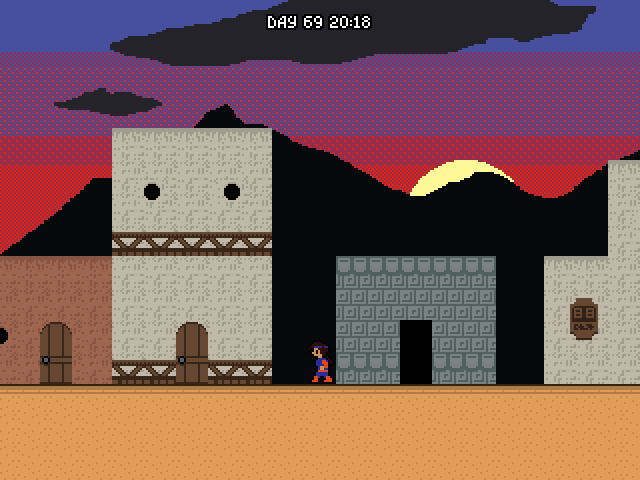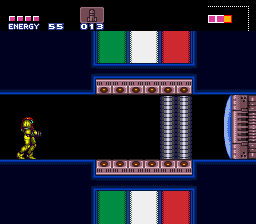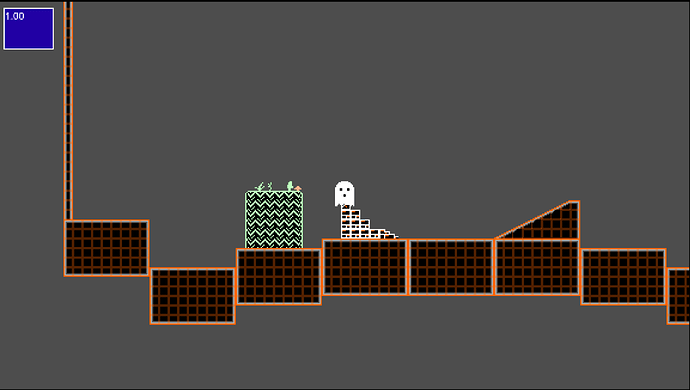EDIT: I realize maybe I should specify, you can download the shader from the video description; it includes documentation in the source file. The effects on the title cards are done with it as well—you can get a lot of different visual effects with it.
ah yeah a Thomas Bernhard inspired visual novel starring talking animals




(btw, the day and time being printed on the screen like that is a debug function lol)
Instead of working on my fighting game engine proper I made a dungeon thing with it. Took two days for everything except the lighting, which then sent me into a 10 days reevaluation of how I’ve approached this, since the fighting game really only needed just one hacky directional light to get ground shadows. Now I’ve got a much more generic solution, supporting several lights of several types.
https://i.imgur.com/rBjiGxu.mp4
EDIT: imgur is being difficult with embeds for whatever reason so let’s make this the screenshot club in more than name.
Part of a commission:
This is the client’s (very cute!) character Oppet, whom Lily made this 3D model of, to which I added the mouth at the client’s request, massaged the geometry of to better support rigging, and rigged; Lily then used the rig and made the lute-playing animation. I recorded this music for Oppet to play (including e.g. as an audio source in Unity hence the looping), Lily made this whole forest environment and the ghost sprites and things, then I animated the ghosts bouncing up and down, added little eye and mouth movements to Oppet’s animation, made various static and animated cameras and “filmed” the scene with each, and then edited the results into this video.


The hardest part of this was figuring out how to get the scrolling not to snap suddenly in the second room going up. I had some scroll triggers set up to fix this, but they were not triggering in the particular case of going upwards while in the second room (going downwards it worked perfectly fine).
Apparently the game puts Samus in a state where she is completely intangible after an upwards elevator transition (presumably so she doesn’t touch the door back down while she visually crosses it). To circumvent this I had a friend help teach me how to write some room-specific ASM to act as an ersatz trigger.
i hate this game so much
The first model viewer I made was for FF9, 15 years ago. Never released a public version, though. Well, now it’s a Blender plugin: GitHub - Chevluh/FF9_Blender_Importer: FF9 Blender Importer
current progress on the first pass of the nuts and bolts level design:

this game is actually pretty fun to work with once you know the basics and aren’t determined to do something utterly stupid
(still have no idea what’s gonna be behind this door)
Rewriting the Ghost Game in Godot 4. This has been a great opportunity to clean up all the weird code that accreted as I was learning the Godot idioms.
The big emphasis on this revision of the game is actually getting the gameplay to feel good and then focusing on the level design. To this end I have built a system to record motion for the character and other objects in the scene and to display the last play in the editor with both a track and a moving sprite.
I get the impression that a lot of this kind of platformer game design is playing naturally and then designing hazards and so forth around the natural motion of the character. So I can do that now. I have no idea how they did this in the 8/16 bit era. It must have taken so much trial and error.
Manta, crab, octopus, and building models are by Lily (including sand+cones), coral, moss, and hanging kelp models, animations, shading effects, and music are by me. Part of a freelance project for an upcoming game.
that song is rad
Thanks, I’m glad you like it! I wrote a few new synths for this one—a bodhrán-esque drum
an orchestral shaker
and an instrument I originally intended for making metallic “bong bong”-type cymbal sounds but which I ended up using for both cymbals generally and the bassline, and which can make a variety of other sounds as well
These are all essentially FM-synth-based. I keep meaning to post a rundown of how these and the synths in the earlier videos work internally…I should probably just stay focused on this project for now because the final build is due on the 20th, but maybe after that. As a side note, the other two instruments in the above piece, the lead and the “comping” accompaniment, are both wavetable+subtractive synthesis, although the comp has a phaser and the lead has a ring mod on it sometimes (that’s where its “skittering” effect in the second half comes from).
Very cute!
Thanks. Your music rules.








